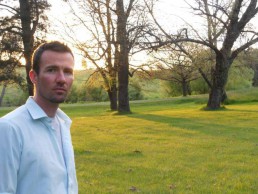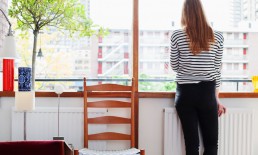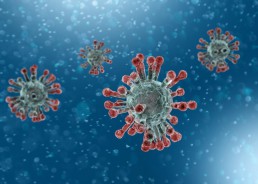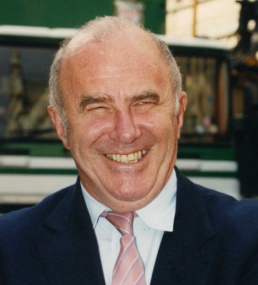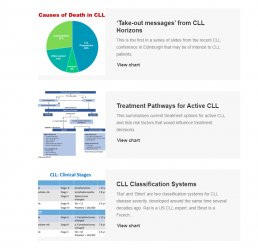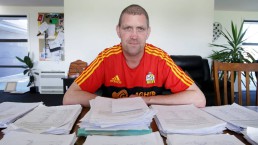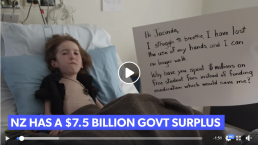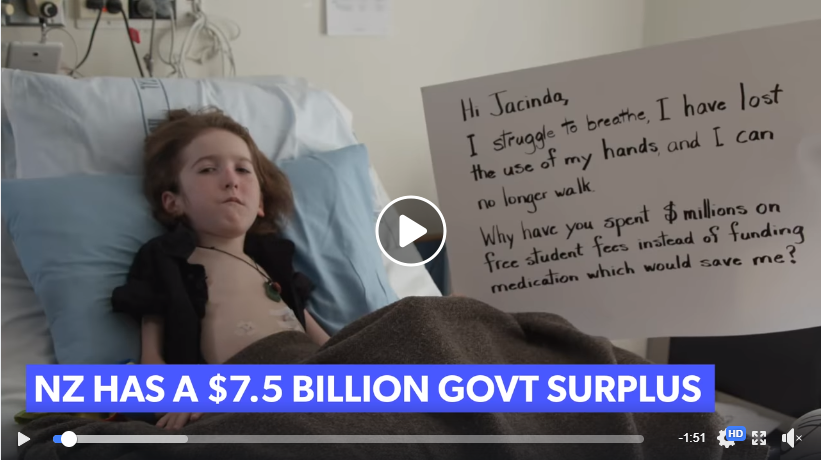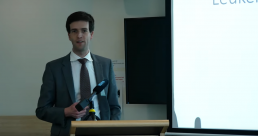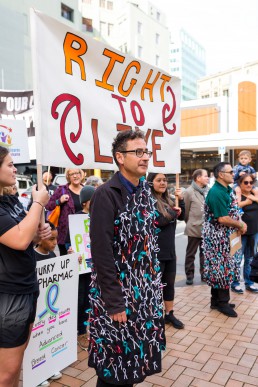‘It is daunting to be told how personally dangerous coronavirus is’
‘It is daunting to be told how personally dangerous coronavirus is’
This story is behind a paywall, however if you have access or sign up for a free trial you’ll be able to read the full article by Sam O’Neill, a UK reporter with CLL. Access the full article here: https://www.thetimes.co.uk/article/coronavirus-it-is-daunting-to-be-told-how-personally-dangerous-this-virus-is-7qbfqxl9k
I have never before considered myself to be a vulnerable person. As a reporter, much of my work has been about highlighting the plight of the vulnerable.
Today, however, I expect a letter from the NHS telling me that I am “extremely vulnerable” if I contract Covid-19. It will tell me to stay at home for at least 12 weeks and will be followed periodically with text messages giving advice and information. I am part of the group with what are so often blandly referred to as “underlying health conditions”. My problem is chronic lymphocytic leukaemia (CLL), which means my body makes too many white blood cells. Left unchecked these will crowd out the red cells and threaten vital organs.
Coronavirus in NZ: How to self-isolate - Kiwi diagnosed with cancer shares advice
Coronavirus in NZ: How to self-isolate - Kiwi diagnosed with cancer shares advice
A Kiwi diagnosed with cancer has shared advice on how to self-isolate while living with others and what precautions immunocompromised people should take.
The Government has announced that people travelling into New Zealand, except from the Pacific Islands, have to self-isolate for 14 days.
This has sparked many questions on how self-isolation works and how to deal with it when more than one person lives in a home.
Auckland man, Earle Wilco, 44, moved to Island Bay, Wellington, from Shanghai when he was diagnosed with chronic lymphocytic leukaemia (CLL) last December.
“Mid-cycle, my immune system drops and I become very susceptible to infections, colds and flu,” he said.
He has had to self-isolate during these times while living with his friend and his two children, aged 11 and 14.
After seeing a friend in Wellington seeking advice on how self-isolation works, Wilco has shared his knowledge through his own experiences, which also includes self-isolation during a norovirus outbreak in 2005.
“Self-isolating in a house share is particularly tricky, but it can be done if all the housemates pull together,” he said.
“My suggestion for someone returning from overseas who has to self-isolate in a house share situation is this:
“1. Inform everyone of your arrival time so they can clean the house. Make it clear that you’ll need help with food shopping and even cooking sometimes, set up bank transfers with all housemates so you can pay them if you ask them to buy you stuff. Set up a special house WhatsApp group chat.
“2. Once home, stay in your room as much as possible. If there’s more than one bathroom in the house, have one dedicated only to you, this will remove a lot of cross-contamination potential. Likewise, keep your own sheets, towels and cutlery separately. (If you can’t have a dedicated bathroom, make sure you wipe down all surfaces with disinfectant after you use it).
“3. If you have to be out of your room when others are around, wear a mask, wash your hands, and wipe down surfaces that you touch.
“4. Food can be delivered to your bedroom door. They knock, walk away, you retrieve it.
“5. Make sure you have a digital thermometer, and check your temperature regularly. If it gets above 37.5, call your GP or after-hours clinic, outline your situation and wait for advice.”
Wilco’s advice is very similar to the advice given by the Ministry of Health and other disease experts including University of Otago epidemiologist Professor Michael Baker.
“It’s not home detention – people can wander around the streets and get some exercise. The thing is about not infecting other people if you might be in the early stages of incubating this infection,” Baker previously told the Herald.
During his chemo self-isolation periods, Wilco said he follows all these guidelines along with more.
“I try to time cooking and using shared spaces when everyone is out,” he said.
“This is as much for my safety as the safety of my housemates, as when you’re doing chemo, you’re awash with toxic chemicals which come out in your body waste.”
Wilco said the precautions he is taking now because of the Covid-19 outbreak are the same as he uses when his immune system is low.
This includes limiting travel, staying away from groups of people, sticking to his room whenever possible, eating healthy, washing hands frequently and keeping his distance with others.
Meanwhile, Wilco said he hasn’t had any problem with Covid-19 as he left China before the outbreak. However, his wife is stuck in China.
“She went back to Anhui Province for Chinese New Year and got caught there with the city lockdowns, so she was in quarantine for about 50 days, only allowed to leave the house once a day for supplies,” he said.
“She has just got back to Shanghai last week and has to self-isolate for another 14 days.
“We also have a lot of friends in Wuhan, so we get lots of information and advice. The stories are frankly heartbreaking.”
His last piece of advice was for people not to panic.
“It is a pandemic and it is taking lives, it needs to be taken seriously, so the best thing people can do is limit close personal interactions and practice good hygiene.”
Immunocompromised precautions
According to the Ministry of Health, those who are underlying medical conditions, such as a compromised immune system, liver disease, cancer, kidney disease, heart disease and diabetes mellitus, need to take more precautions to protect themselves from Covid-19.
It recommends immunocompromised people to take the following simple steps to protect yourself and others:
• Avoid close contact with people with cold or flu-like illnesses.
• Cover coughs and sneezes with disposable tissues or clothing.
• Wash hands for at least 20 seconds with water and soap and dry them thoroughly:
– before eating or handling food
– after using the toilet
– after coughing, sneezing, blowing your nose or wiping children’s noses
– after caring for sick people.
There are also additional measures that immunocompromised people should take:
• Avoid staying with a person who is self-isolating (because they are a close contact of a confirmed case of Covid-19 or have recently travelled to any country except those listed in the countries and areas of concern under Category 2.)
• Stay at least 2 metres away from people who are unwell.
• Checking safe travel advice about Covid-19 if you plan overseas travel.
• Those who take immunosuppressive drugs we advise that you do not stop this medication without first consulting your GP or specialist.
Originally published on the New Zealand Herald
Coronavirus: how to self-isolate
Coronavirus: how to self-isolate
What to do if you have symptoms of Covid-19, have travelled to a badly affected area, or have been in contact with someone who has the disease.
1. Stay at home
This may sound obvious, but don’t leave home except to get medical care (and if you do, make sure you have called ahead). Say no to visitors. Contact friends and family online or by phone. If you use online shopping for deliveries of food, medicine or other necessities, make sure delivery instructions say that items should be left outside, not handed over in person. If you ask friends or family for help bringing you supplies, get them to do the same.
2. Separate yourself from others
Stay in one room, with the door closed – ideally a room that has a window to the outside that you can open. Don’t share crockery, cutlery, glasses, bedding or towels with anyone in your home when you have used them. Dishwashers can be used to clean crockery and cutlery. If that isn’t possible, wash by hand and dry using a separate tea towel. Laundry, bedding and towels should be placed in a plastic bag and washed only when tests for Covid-19 are negative or self-isolation is over, if possible. Do not take anything to a launderette. If you have to wash at home, use temperatures of at least 60C.
3. Food and bathrooms
Have meals left outside your door. If you cook for yourself, do so, if possible, when others are not in the kitchen – and take food back to your room to eat. If you have more than one bathroom in your home, use a separate one. If you have to share, ensure you clean it thoroughly and regularly. If you live in shared accommodation (such as university halls of residence), leave your room only when necessary, ideally wearing a mask, if you have one. Try to avoid using the kitchen or bathroom while others are there.
4. Keep away from pets if possible
Wash your hands before and after contact as a precautionary measure.
5. Safely dispose of tissues after you cough or sneeze
Dispose of them into a plastic bag and immediately wash your hands with soap and water, and dry thoroughly. If you have one, wear a mask when you are in the same room as others, or if you go out for medical treatment.
6. Hand washing
The rules are similar to those for all people – wash your hands often and thoroughly, using soap and water, for 20 seconds Then rinse and dry thoroughly. Avoid touching your eyes, nose and mouth with unwashed hands.
7. Waste disposal
All waste that you have been in contact with, including used tissues and masks, should be put in a plastic rubbish bag and tied when full. The plastic bag should then be placed in a second bin bag and tied. Do not dispose of it or put it out for collection until you have test results, or until quarantine is over. If you test positive, you will get instructions on how to dispose of the waste.
8. If symptoms worsen
Seek medical help quickly if you develop new symptoms or if your symptoms worsen (for example, if you have problems breathing).
COVID-19 and CLL
COVID-19 and CLL
This article was originally published on CLL Society
We are receiving many requests to suggest any special precautions for us, CLL patients, in response to the spreading risk of coronavirus (COVID-19).
First, this is an evolving situation with more unknowns than knowns at the present time.
Second, it does appear that those over 60 years old are at increased risk for a more serious infection. That would include many of us CLL-ers.
Next, those who are immune suppressed (and all CLL patients, whether treated or not, are immune suppressed) are at a higher risk for serious disease, but perhaps there is less of an increased risk for us than for those with heart or lung conditions. There is almost no data out there to provide clarity on this important issue.
There is also no clarity as to whether we are at higher risk to acquire the infection, only that we are more likely to have a rough time if we do get it. So far it does not appear that we are at higher risk to become infected, but again there is just too little information to be certain at this time.
The prudent course of action is to follow the CDC and WHO guidelines that, besides hand washing, elbow bumps, avoid touching your eyes, nose, and mouth, cleaning and disinfecting frequently touched objects and surfaces, and more, now the CDC advises high risk folks like us to avoid travel and crowds. This was a change as of March 5, 2020.
In a proactive and cautionary move, the CLL Society canceled all Support Group meetings and Patient Educational Forums scheduled for March. Soon after announcing this, LLS and LRF canceled meetings as well.
For general information from the CDC, please see: https://www.cdc.gov/coronavirus/2019-ncov/about/index.html and for high-risk populations, including CLL patients, see: https://www.cdc.gov/coronavirus/2019-ncov/specific-groups/high-risk-complications.htmlI myself have canceled 2 trips for CLL-related education this month.
The CLL Society is closely monitoring the COVID-19 outbreak and will provide updates through the website, and will, when appropriate, through our email list, as soon as more information becomes available. Rather than sending individual emails with your questions, please sign up for our Alerts and check the website for the latest COVID-19 news.
RIP Clive James
RIP Clive James
Clive James, the Australian wit, broadcaster and poet died last Sunday at the age of 80, ten years after being diagnosed with CLL.
He wrote the best — the only? – poem about chemotherapy, specifically about Ibrutinib. the wonder drug that helped keep him and many thousands of others alive for a lot longer than expected. Here it is:
Ibrutinib
The Marvel Comic name should tip you off
That this new drug is heavy duty stuff.
You don’t get this one just to cure a cough.
A chemo pill, and powerful enough
To put the kibosh on your CLL,
It gets in there and gives the bastard hell.
Five years’ remission and the beast is back.
It’s in your bones the way the Viet Cong
Poured through their tunnels to the Tet attack,
And what comes next might not last very long.
But let’s see what Ibrutinib can do
To win the war whose battlefield is you.
Ibrutinib, you little cluster-bomb
Of goodness, get in there and do your thing!
All that the bad guys seek is martyrdom:
Their own demise is the death they bring.
They work in cells. There is no high command.
We let you in and then it’s hand to hand.
Should you prevail, we promise you a role
From here on until the natural end.
Just beat them back and it will be a stroll,
Unless you don’t, in which case things might tend
To go bananas in a serious way.
But not yet. Down the hatch. This is today.
***
Inspirational stuff — and Ibrutinib really is a remarkable drug, a pill rather poisonous goo, showing the way to targeted treatment of leukaemias and other cancers. Only Clive James could make it sound so poetic!
Cancer Control Agency open, Prime Minister hails Blair Vining's 'tireless advocacy'
Cancer Control Agency open, Prime Minister hails Blair Vining's 'tireless advocacy'
This story was originally published on Stuff
The Prime Minister has acknowledged Blair Vining’s “tireless advocacy” as the new independent Cancer Control Agency was formally opened on Tuesday.
During Vining’s final months, as he was dying from cancer, the Southlander pushed for the Government to set up an independent cancer agency to improve cancer care for New Zealanders.
In September, a matter of weeks before Vining died, he attended an announcement in Auckland where Prime Minister Jacinda Ardern revealed the Government’s Cancer Action Plan, which included setting up a cancer agency.
On Tuesday, weeks after Vining’s death, the cancer agency has been opened.
Ardern pointed to the work of Vining when she announced the agency as open.
“I want to acknowledge those who’ve worked so hard to ensure better cancer care in New Zealand, especially Blair Vining whose tireless advocacy for the establishment of this agency has left an important legacy,” Ardern said.
”Today’s official opening marks the start of a new era for cancer care in New Zealand. The Cancer Control Agency will play a critical role in ensuring all New Zealanders get world-class cancer care, no matter who they are or where they live.”
Ardern and Minister of Health David Clark also announced the makeup of the advisory council that will support.
Included is Dr Chris Jackson, a medical director of the Cancer Society, medical oncologist, and senior lecturer at the University of Otago.
Jackson was also Vining’s doctor and the pair became close as they battled together for better cancer care in New Zealand.
Other council members include Dr Ashley Bloomfield, Dr Nina Scott, Dr Richard Sullivan, Shelly Campbell, Graeme Norton, Professor David Tipene-Leach, and Alisa Care.
Professor Diana Sarfati has been appointed by the State Services Commission as interim chief executive for the agency.
Health Minister Dr David Clark said recruitment was underway to bring the agency up to close to 40 full time staff.
“Professor Sarfati and her team will be supported by [the] advisory council made up of leading clinicians, experts and consumer representatives. The calibre of the people who have agreed to be members of the council speaks for itself, and shows just how committed the entire health sector is to making progress on cancer.”
Consultation on the Cancer Action Plan has now been completed, with nearly 400 submissions received from individuals and organisations.
The final plan will be released early next year.
Petition for Patient Voice Aotearoa: Reform Pharmac and double the Pharmac budget
Petition for Patient Voice Aotearoa: Reform Pharmac and double the Pharmac budget
There are issues involving Pharmac and how they fund medicines – Pharmac does not adopt international guidelines; it does not set a timeframe by which it will be decided if a medicine is efficacious and another timeframe when it will endeavour to fund a medicine if it is deemed to be efficacious; it needs to establish a rapid access scheme; and the budget needs to be increased as its budget is just over 5% of the Vote Health budget in comparison with the OECD average of 16%.
Sign the petition here: https://www.parliament.nz/en/pb/petitions/document/PET_91080/petition-of-malcolm-mulholland-for-patient-voice-aotearoa
Follow Patient Voice Aotearoa here on Facebook: https://www.facebook.com/patientvoiceaotearoa/
CLL forum with Dr Philip Thompson
CLL forum with Dr Philip Thompson
Dr Philip Thompson is a clinician and researcher at the MD Anderson Cancer Centre in Texas. In October 2019, he presented at a Leukaemia Foundation forum on the latest research and directions in CLL management and treatment.
Pharmac to respond to CLLANZ petition
Pharmac to respond to our petition at Health Select Committee hearing this week
Go along in person or watch live on Facebook (see details below) as Pharmac presents their oral submission at the Committee’s meeting on Wednesday, 23 October 2019, from approximately 08.30am to 09.50am, at Parliament Buildings in Wellington. They will address all of the following petitions in one submission.
- Petition of Jeffrey Chan: Ask Pharmac to fund Osimertinib
- Petition of Rachel Brown for Ovarian Cancer New Zealand: Fund Lynparza and Avastin for Ovarian Cancer Patients
- Petition of Emma Crowley for Breast Cancer Aotearoa: Breast Cancer Aotearoa Coalition: Fund breast cancer drugs
- Petition of Neil Graham for Chronic Lymphocytic Leukaemia Advocates New Zealand : Fund life-saving treatments for chronic lymphocytic leukaemia
- Petition of Philip Hope for Lung Foundation New Zealand: Ask Pharmac to fund innovative treatments for lung cancer
- Petition of Kenneth Romeril for Myeloma New Zealand: Fund transformative treatments for multiple myeloma patients
- Petition of Janine Yeoman: Lifesaving treatment for people who suffer from Spinal Muscular Atrophy
- Petition of Allyson Lock for the New Zealand Pompe Network: Fund Myozyme for Adults with Pompe Disease
The meeting will be open to the public, and you are welcome to attend in person or watch the live stream of the hearing on the Health Committee Facebook page here.. At this time the exact room the meeting will be held in is not decided, but you will be able to check which meeting room it will be held in closer to the date of the meeting on the Select Committee Schedule webpage here. The meeting room will also be displayed on electronic signboards inside Parliament on the day.

